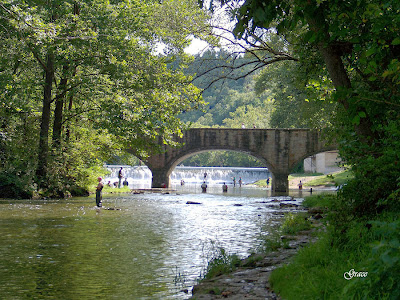The Ozarks vs. San Francisco
Though the Ozarks are often stereotyped as being a region of "hillbilly" culture, which is backwards, conservative, and outmoded, the region has emerged as a center of commerce, with two of the most successful companies in the United States, Tyson and Walmart, and tourist town, Branson. Though the pace and overlying cultural values differ greatly from those of San Francisco, both regions share economic success and bountiful tourist attractions.
Big Spring, Missouri- Pristine beauty of The Ozarks (en.wikipedia.org)
(fineartamerica.com)
History's Effects on Demography & Settlement
The Native Americans of the region occupied the area from 100 BCE-900 CE. The Sioux Nation Osage Tribe inhabited the area between the Missouri and Arkansas rivers.
Congressional Gold Medal awarded November 20th, 2013 in honor of Sioux Osage Native American "Code Talkers", who assisted soldiers during WWI and WWII.
Euro-American settlers who entered the region in the nineteenth century were mainly Scots-Irish and Germans. Since the Appalachian region was heavily populated, some Scots-Irish fled to the Ozark Plateau, and subsisted from a self-sufficient lifestyle. Germans immigrated to the United States from 1850-1880, and settled in Kentucky, moving west and into the northern Missouri bottomlands and the Mississippi river floodplains. They were farmers, and purchased land from other farmers. Hillbilly culture is native to the region, and characterized by political conservatism, self sufficiency, maintenance of tradition, hunting and fishing, suspicion of outsiders, and country music. Country music "…evolved from Celtic and English folk songs…" (Mayda, 292) Protestant Christian religion plays a great role in the culture of the region, and it is often called the "Buckle of the Bible Belt" for this reason.
Climate & Geography
The karst topography of the region has indented the landscape with caves, sinkholes, and water that discharges from springs and rocks. Plains surround the hills, which are lower than mountains. The Ozark Plateau is characterized by steep limestone hills. Here, the Lead Belt hosts iron ores, zinc, and other minerals. Geothermal Springs are a natural resource that could be utilized for sustainable energy, but this has not yet happened efficiently. Climate change will likely affect the region greatly, with pines replacing oak/hickory forests, forests retreating and being replaced by grasslands, and vines choking trees due to rising carbon dioxide levels. The temperature ranges of the region create four easily identifiable seasons, with an average of 80 degrees in the summer, and 34 degrees in the winter. These seasons are more severe than in San Francisco, as temperatures hardly ever go below 30 degrees during winter in San Francisco.
Winter in The Ozarks (www.dorothymhauser.com)
(www.blackburnsresort.com)
Economy
Agriculture is a large faction of the region's economy, albeit under modernized conditions. Industrial giant Tyson, essentially recovered the Ozark's agricultural economy. Tyson's methods of growing chickens are intensive, and often criticized for their compromised ethical implications. Seven thousand contract farmers provide land and labor, while the corporation controls the chickens, the feed mills, the hatcheries, and transportation. The chicken whole industry is thus contract farmed. The unintended consequences the chicken growing industry has caused is nutrient overload in soil and groundwater, carcinogenic materials in manure dust, antibiotic resistance, and contamination from CAFO surface water. The New Lead Belt consists of lead, zinc, and copper production, though the toxicity levels have caused lifelong learning and behavioral disabilities in children. The world's largest retail company, Wal-Mart, was birthed in the region, and has an annual sales amount of $300 billion. Though the company has acknowledged the need for energy-efficient procedures, it is lacking in social and environmental responsibilities. Unlike the region, San Francisco is not reliant on agricultural or retail industry.





No comments:
Post a Comment